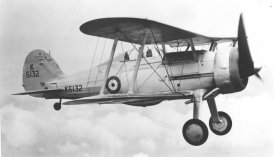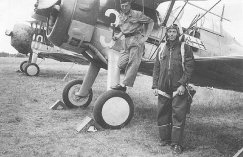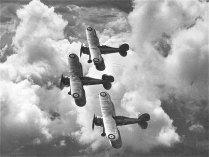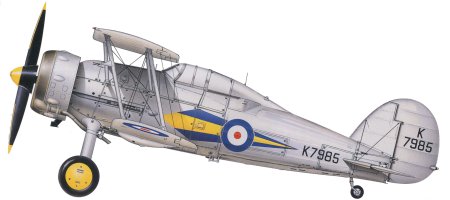
Gloster Gladiator
Despite being a biplane the Gladiator saw widespread action during the early stages of World War II. However, the results only underlined the type's obsolescence. The single squadron of Gladiators in Norway and the two squadrons based in France were all but wiped out during the German invasions in May and June 1940.
Other Gladiator squadrons fought in North Africa, Greece and Palestine in 1939 and 1940. Many were flown by Australian and South African units and a few were transferred to Egypt and Iraq. Another 36, which were supplied to China, joined the war against Japan in 1938.
The Sea Gladiator variant served aboard the aircraft carriers Courageous, Eagle and Glorious and a handful were based in Malta when Italy joined the war in June 1940. For the next month, just four aircraft were the island's only defence against the Italians.
Biplane fighters were already on the way out when the Gladiator development of the Gloster Gauntlet was proposed in 1933, but Britain's urgent need for combat aircraft led to orders for an eventual total of 581. These included 350 Gladiator Mk IIs, which had improved equipment and three-blade metal propellers in place of the Gladiator Mk I's two-bladed wooden airscrew. All had been delivered by April 1940 and a number went into combat.
 |
 |
 |
| K5200 was the Gladiator prototype. The enclosed cockpit had yet to appear, although the gun armament was fitted at an early stage. |
The Gladiator prototype flew for the first time in September 1934 as a private venture. The Air Ministry ordered the type the following year, with 480 being delivered. |
Representing the RAF's fighter force of 1938, these tethered Gladiotors practice for the 1938 Hendon air display. |
|
Gloster Gladiator (Technical Specification) |
| Role |
Single-seat interceptor |
| Manufacturer |
Gloster |
| Maximum Speed |
407 kmh (253 mph) |
| Maximum Range |
547 km (340 miles) |
Ceiling |
10,060 meters (33,000 feet) |
Weight
Empty
Maximum Takeoff |
1,565 kg (3,450 lbs)
2,155 kg (4,751 lbs) |
Dimensions
Wingspan
Length
Height
Wing Area |
9.83 meters (32 ft 3 in)
8.36 meters (27 ft 5 in)
3.15 meters (10 ft 4 in)
30.01 square meters (323 sq ft) |
| Engines |
One Bristol Mercury Mk IX air-cooled radial engine which provides 627-kW (840-hp) |
| Armament |
Four 7.7 mm (0.303 in) Browning machine guns
Two nose-mounted and two wing-mounted |
Photo Gallery
Click here to submit your photo
| Have A Passion For Aircraft? |
Subscribe to our 14 series FREE newsletter
delivered weekly on World War 2 Aircraft factfile... |
| NB:- We hate spam as much as you do, so your email address will NEVER be shared with or sold to anyone else. That's a Guarantee. |
|
|





